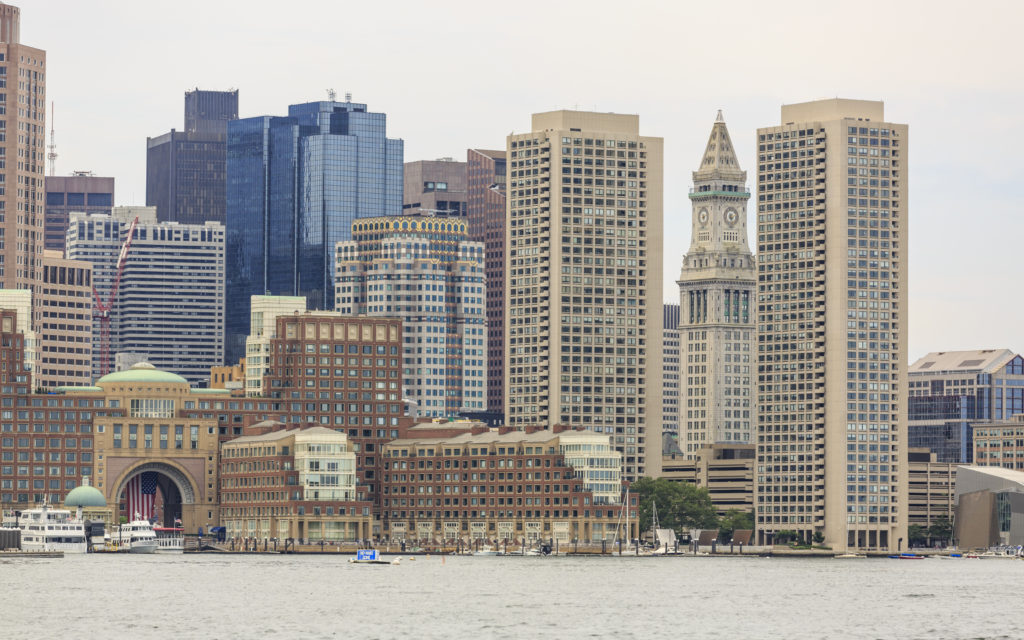
CLF has announced our intent to file a lawsuit to ensure that the city and state protect access for all to the Boston Harbor, rather than selling the public out in favor of real estate developers. Photo: EcoPhotography
Updated July 17: Last week, we filed a lawsuit against the Commonwealth of Massachusetts for diminishing the public’s right to the use of Boston’s waterfront. The suit challenges the approval by Secretary of Energy and Environmental Affairs Matthew Beaton of the city’s Downtown Waterfront Municipal Harbor Plan (MHP) and the municipal harbor planning process. Approval of the plan not only violates decades-old laws governing the waterfront but also sets a dangerous precedent by signaling to developers that they can buy their way out of rules that have balanced public and private development interests for years. We are committed to making sure that the public’s interests are protected, so stay tuned for more information on the lawsuit as we move forward.
If you look at Boston Harbor from Downtown Boston today, you see a beautiful body of water that should be used and enjoyed by everyone – from children in Dorchester to families from Roslindale. From Boston’s Harborwalk on the downtown side, you can also view a growing Seaport district, with gleaming glass towers, luxury condos, and fancy restaurants. But the Seaport also acts as a warning signal: If we’re not careful, Boston Harbor will be walled off to those of us who are not wealthy and powerful, even though we have laws and regulations put in place to protect us. So today, CLF is taking action to ensure that the city and state cannot get away with putting private developers’ interests ahead of the public when it comes to these precious public assets.
We have announced our intent to file a lawsuit to preserve public rights on the waterfront. Our lawsuit is in response to the approval of the Downtown Waterfront District Municipal Harbor Plan (MHP) by Massachusetts Secretary of Energy and Environmental Affairs Matthew Beaton.
The Downtown MHP Doesn’t Meet Chapter 91’s Requirements
In short, this approved MHP allows development in the Downtown Waterfront District to ignore state law that protects the public’s rights in tidelands. So here’s what is important to understand about the suit: CLF’s legal challenge is not about any individual project on the waterfront. It is about making sure that the city and state protect the public interest, rather than selling the public out in favor of real estate developers.
Secretary Beaton acknowledged in his April 30 decision that the City of Boston failed to take the considerations of stakeholders and the public into account, which should have forced the plan’s denial. Instead, the Secretary substituted his own values for bipartisan standards of waterfront development that have been in effect for decades when he approved the MHP. As a result, the public will lose greater access to Boston’s waterfront and inappropriately large projects can be built.
The Secretary’s decision also arbitrarily abandons principles governing waterfront development in place since 1990, particularly standards that waterfront buildings should step down in height as they approach the water’s edge and that ample waterfront space and public facilities should be provided for public use and enjoyment adjacent to development. The decision authorizes the construction of one of Boston’s 10 tallest buildings, immediately adjacent to the harbor front.
The Downtown Municipal Harbor Plan is a fundamentally flawed regulatory document produced by a fundamentally flawed public process. We are challenging the city’s and state’s efforts to circumvent the public process to allow developers and their political supporters to evade their public trust responsibilities. And we are going to do everything in our power to prevent Boston Harbor from being walled off from the public for the benefit of only a few people.
We’re Taking Action to Protect Your Rights
A little history on the Commonwealth’s relationship to tidelands: Since the 1600s, there has been a covenant between the people of Massachusetts and the government regarding public trust lands or public tidelands. The modern interpretation of that covenant was written into state law in the 1983 as the Massachusetts Public Waterfront Act, commonly referred to today as “Chapter 91.”
The Massachusetts Department of Environmental Protection (MassDEP) conducted an extensive public process in the late 1980s to develop regulations for these waterfront lands, allowing private development only under strict conditions. Those regulations include rules on maximum heights, minimum public open space, waterfront activation requirements, and public participation.
The MHP process was established around this same time to give municipalities some flexibility in waterfront planning while achieving public benefits. Despite some concern that the MHP process may be used to circumvent the regulations, administrations under both parties have achieved at least equivalent public benefits. Under the current administration, however, the MHP process has become the loophole by which developers and their political supporters evade those public trust responsibilities. The public process is increasingly becoming a charade, while the real decisions are all made behind closed doors.
We’re Fighting to Change the Flawed Process
The lawsuit we are filing reflects our concern about a Municipal Harbor Plan process that has devolved into something unrecognizable. This has implications for cities and towns across the Commonwealth – not just Boston. As misuse spreads, it erodes the public trust and turns our public tidelands into places that only an exclusive few can access, use, and enjoy.
Those who raised concerns about the Downtown MHP process have been ignored. Despite many public meetings held by the Downtown MHP Advisory Committee, 11 committee members wrote a letter to the committee chair expressing their frustration that their role and input were being “discouraged if not ignored.” Their grievances were never resolved.
With this decision, Secretary Beaton has signaled that waterfront development rights are for sale and at a bargain: You can buy your way out of the state-mandated minimum height and open space requirements. If this is an option, why would any developer chose to provide public access and benefits on-site?
What we are asking for is simple – accountability, transparency, consistency, and an avenue for judicial review. Above all else, we are asking for the law to be enforced. We will continue fighting to ensure that Massachusetts residents have the access they deserve to one of the region’s greatest public assets, Boston Harbor.
Join in Our Fight
If you’re interested in learning how you can help is in this fight, please contact us.



